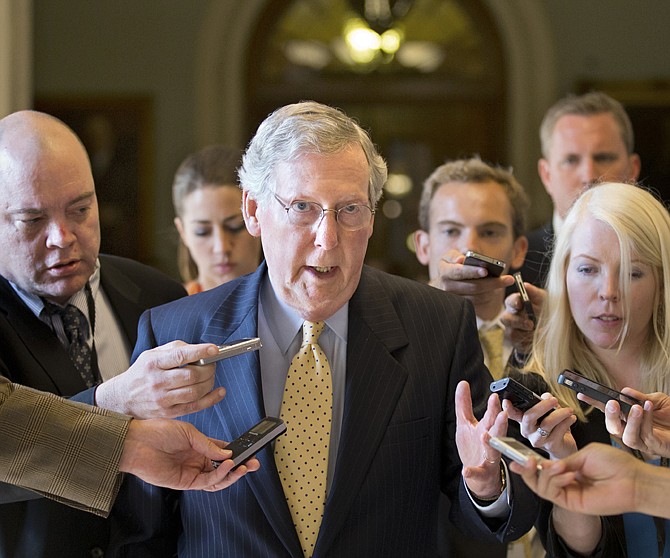WASHINGTON (AP) - A showdown looming, Republicans and Democrats held extraordinary marathon talks behind closed doors over the fate of several of President Barack Obama's stalled appointees Monday night in a dispute that threatened what little bipartisan cooperation remains in the Senate.
Lawmakers from both parties reported progress as the meeting in the Capitol's Old Senate Chamber moved through a third hour.
Nearly all 100 senators attended what amounted to an off-the-record session of the Senate down the hall from where lawmakers customarily debate the issues of the day with the public and news media in attendance.
Emerging at one point, Sen. Pat Roberts said the talks were continuing and had been productive. "I think the mood there is "How can we get out of this?'" said the Kansas Republican. He offered no details.
A Democrat, Montana's Sen. Jon Tester, said a short while later that the two sides were not very far off in their search for a way out of a dispute that has long festered. No details were available of the session, which occurred in a room where 19th century senators hotly debated the future of slavery and other long-ago issues.
Majority Leader Harry Reid insisted in advance that Republicans permit yes-or-no confirmation votes on all seven of the nominees at issue. If they won't, he declared, Democrats will change the Senate's rules to strip them of their ability to delay.
There was no formal response from Republicans, although Reid and Senate Republican leader Mitch McConnell met privately during the day. Officials said several possible compromises had been floated in various meetings and conversations.
"Maybe there's a little bit of a thaw," said Sen. John Thune, R-S.D., as he entered the meeting. "The leaders are continuing to talk, the White house is involved in discussions with some of our members. Nothing has resulted from that, but the fact that people are still talking is a positive."
Officials in both parties said there had been discussions about Republicans stepping aside to permit confirmation for nearly all of the seven, with Obama agreeing to submit a replacement for at least one of two stalled appointees to the National Labor Relations Board.
"Minor change, no big deal," Reed said of the possible rules change. "My efforts are directed at saving the Senate from becoming obsolete."
Republicans counter that a rules change made unilaterally by one party would profoundly alter the Senate, where both parties pay tribute to maintaining minority rights that are far stronger than in the House. Rules changes generally are made with at least two-thirds vote of the Senate, assuring bipartisan support.
"I guarantee you, it's a decision that, if they actually go through with it, they will live to regret," McConnell said last week of the Democrats.
At the core of the dispute is the minority party's power to stall or block a yes-or-no vote on nearly anything, from legislation to judicial appointments to relatively routine nominations for administration positions. While a majority vote is required to confirm presidential appointees, it takes 60 votes to end delaying tactics and proceed to a yes-or-no vote.
The Democrats are threatening to change the rules only as they apply to nominations for administration positions, not judges or legislation, although Reid appeared to hedge when asked what other changes he might want to make. "Nothing right now," he said.
Sen. Jeff Flake, R-Ariz., noting he was elected to the Senate only last year, said that despite Reid's contention the change was potentially momentous. He said the need for confirmation means appointees must hear the concerns of individual senators in a way that is not the case with House members. He said the chances were strong that once the rules were altered, one party would expand the change to include "judicial nominees that have a lifetime tenure" or even legislation.
In its purest form, a Senate delay can mean a classic filibuster - such as when Sen. Strom Thurmond stood at his desk in 1957 and spoke for a few minutes longer than 24 straight hours in an unsuccessful attempt to prevent action on historic civil rights legislation.
In the past half-century, the filibuster has evolved, as have other means of stalling votes without requiring an around-the-clock speech that defies human endurance.

